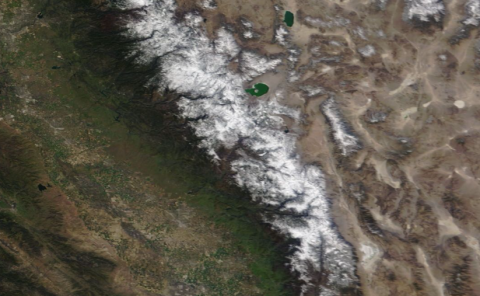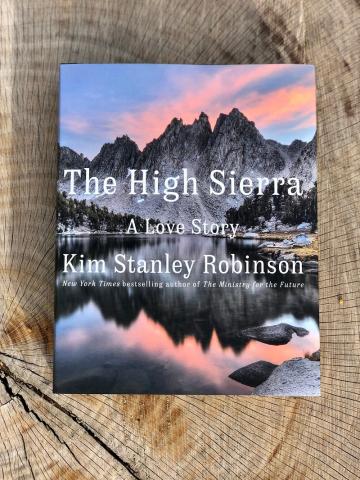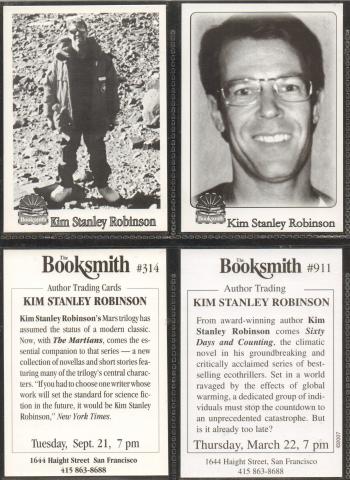High Sierra and Ministry updates
Submitted by Kimon
Now that summer heat is dying down, it's time for the big infodump on what the prolific KSR has been doing of late. This is going to be a big one!
First off, some interviews with KSR, out promoting his latest book The High Sierra, but also the ever-timely The Ministry for the Future.
Bryan Alexander: Academia, climate change, and the future
If a real revolution leading to a real post-capitalism comes into being by way of the public insisting on it, by demonstrations and votes, then how would that be bad? It wouldn’t be bad. So to hope for it is not naive or stupid.
The New York Times: A Sci-Fi Writer Returns to Earth: ‘The Real Story Is the One Facing Us’
“I decided that it was time to go directly at the topic of climate change,” Robinson said. “The real story is the one facing us in the next 30 years. It’s the most interesting story, but also the stakes are highest.”
The Sierra Club (of course!): Minister for the Sierra
“When I was younger, I didn’t notice interactions with wild animals as being transformative and important,” he admitted. “Now when I see wild animals up there, it’s like sticking my finger in a wall socket.”
The Orange County Register: The Book Pages: Kim Stanley Robinson shares the books he loves — and a story that improved with age
I like the cover of my novel “New York 2140” very much. Otherwise, to tell the truth, I don’t much notice covers.
Fatherly (Cory Doctorow): Growing Up Fast On Planet Earth
I came home and I realized that it’s best to spend more time outdoors than we do. There’s a lot of people who know it’s fun to be outdoors because they’re carpenters and they’re outdoors all the time, and they like it. Farmers too. But writers, not so much. So a garden, working outdoors and then being an activist for environmentalist causes, greening everything in my life and my political aspirations of looking for what would be best for the biosphere.
Book Forum: Mountain Song
I start with a situation, usually. Say I want to write about terraforming Mars—then I need a terraformer, a person opposed to terraforming, a political radical, a Machiavel, a builder, a psychologist, etc. The French structuralists spoke of characters as actants, as the action-doers who make the plot happen. A single character could cover a couple of actants at once, or an actant could be split between a few characters. This I’ve found useful in clarifying things to myself as I get started. Therefore, characters are, at first, kind of just positions, or needed operators of the plot. But this is just the start.
Another useful conceptual tool is protagonicity. Does a novel have high protagonicity or low protagonicity—meaning the story is maybe spread out among a lot of different characters, who might be considered minor characters, except there aren’t any major characters. The story I intend to tell determines or suggests how I might go about deciding this.
High County News: Seeing Mars on Earth
I was surprised how many of my texts have some analogue to the High Sierra. Right from the start, I can see when Hjalmar Nederland is wandering around Mars in Icehenge, it was a Sierra wander. And that kept happening. It was true in my Mars Trilogy. To terraform Mars is really cheating. Mars is basalt rather than granite. It’s poisonous rather than healthy. So, turning Mars into the High Sierras required something like a 2,000-page novel to make it even slightly plausible. I like it when my novels find their way to get in a big walk
Sactown Magazine: Q&A with Sci-Fi Author Kim Stanley Robinson
Once you got up there above the treeline in the Sierra, you were in a different space that was cognitive and emotional and spiritual as much as it was physical. And I think that has to do with the whole sense that humans are only visitors there, nobody lives there year-round. There’s something different about it. It really did take the whole book to try to capture what we were talking about with this single phrase, you know, “up into the God zone.” What the heck did that mean? We were young hippies, all very Buddhist, so it was simplistic hippie stuff, almost a joke, but a joke about a real feeling.
The Times of India: Climate change is now the big story in world history
I felt an obligation to stick with India, after deciding to put that first awful scene there, because it is in such a dangerous spot. I couldn’t just show the disaster and then walk away. Much of the novel is based in Zurich, Switzerland, the home base for my fictional Ministry for the Future, but the minister’s chief executive officer is an Indian (with a Nepali mother), and he and the minister and the story itself keep returning to India, to see what is going on there. This allowed me to show that positive developments in India, in agricultural practices and in governance, are world-class and could lead the rest of the world in positive ways.
Entertainment Weekly: Why prolific sci-fi writer Kim Stanley Robinson's latest book is about real-life mountains
I had been wanting to write about the Sierras for decades, and The Ministry for the Future felt like the end of a sequence of novels, so that it was kind of a case of "now's the time." I was really ready for it.
Literary Hub: Words of Hope, and a Defense of John Muir: Kim Stanley Robinson on His Love of the Sierra Nevadas
I think this book is an anomaly in my career, a one-off. I’d prefer to return to novels and stay behind my characters and my stories, to get out of their way. But also, it’s as you’ve noted; I am a Californian writer, and have written about the state a lot, and of course The High Sierra is a major contribution to that part of my work.
Extinction Rebellion: Q&A with KSR
So on the one hand, I wanted to warn readers that bad things are going to happen; on the other hand, I wanted to describe humanity reacting to the climate crisis in an uncoordinated way that nevertheless dodges the mass extinction event we have started, and comes to a better moment in future history, where even more progress could be made. So ultimately this was a kind of low-bar utopian novel, which presents a good future happening despite the lack of any strong plan imposed from above, or below or from the sides. Instead it results from lots of people trying lots of different things.
Los Angeles Times: Sci-fi master Kim Stanley Robinson on the Sierra and why humans might just ‘squeak by’
There are many places on this planet that are intensely beautiful and lovable. You don’t need to burn a lot of carbon to have a good time. The basics of paleolithic contentment remain the same in us and are available at any time.
The New Institute: Capitalism is the Main Problem
I think my Ministry for the Future says what i have to say about this issue, as a writer and novelist. I’ll let it stand for what I have to say for a few years and see how it goes. It’s making an impact— I don’t want to get in its way by adding bits or sequels or distractions of any kind. As a writer, I’ll pursue a few other projects and see what happens.
My Mars trilogy is a good novel but not a plan for this moment. If we were to create a sustainable civilisation here on Earth, with all Earth’s creatures prospering, then and only then would Mars become even the slightest bit interesting to us. It would be a kind of reward for our success
Politico: Climate Catastrophe Is Coming. But It’s Not the End of the Story.
I chose India because it’s the biggest democracy. It’s one of every eight people on Earth or even more. It’s a mess like any other democracy, but it has the potential to be a leader. Once I put the disaster there in Chapter 1, I made a promise to myself, to my mental India, that I would stick with India. It wouldn’t just be the place that the disaster happened and then everybody else solved the problem.
Interview in Neue Zuercher Zeitung (in German): Ist Science-Fiction der Realismus unserer Zeit
Die Leute waren unheimlich hungrig auf diese Geschichte. Eine Geschichte darüber, wie die nächsten dreissig Jahre gut ausgehen könnten: ohne Superhelden, ohne technologisches Wunder. «Ministerium für die Zukunft» füllte eine Nische. Das Buch scheint mir gelungen zu sein.
Also, a couple of videos:
KSR's Keynote at Future in Review 2022 (with David Brin)
Discussion "From science fiction to climate action" at Hertford College, Oxford
Now for some podcast interviews:
Storytelling Animals: Kim Stanley Robinson on Wildlife, the Martian Constitution, and Loving the High Sierra (podcast)
Azeem Azhar's Exponential View: Imagining Climate Futures with Kim Stanley Robinson
Tin House Between the Covers Podcast: Crafting with Ursula : Kim Stanley Robinson on Ambiguous Utopias
Everyday Anarchism: KSR on The High Sierra
The Ezra Klein Show (The New York Times): A Weird, Wonderful Conversation With Kim Stanley Robinson
Pricing Nature: Kim Stanley Robinson, Kate Raworth, and Delton Chen Discuss "Carbon Currency"
Rick Kleffel's Agony Column podcast on The High Sierra
Planet A - Talks on climate change: Kim Stanley Robinson – On Climate Fiction and “The Ministry for the Future”
Blue Dot: Kim Stanley Robinson and the High Sierra
Plus, you can find more KSR writings in two recent publications:
Tomorrow's Parties: Life in the Anthropocene, edited by Jonathan Strahan, includes an interview with KSR by James Bradley: "It's Science Over Capitalism: Kim Stanley Robinson and the Imperative of Hope" (MIT Press, Penguin Random House).
In Noema magazine issue III: Rupture, Fall 2022.
Kim Stanley Robinson contends that, in the vein of eco-realpolitik, the rest of the world needs to compensate petro-states for their lost income as they transition to a green economy — or they never will.
So, the multi-media multi-mode book of Kim Stanley Robinson The High Sierra is available for nature lovers to enjoy.
You can listen to KSR reading from the audiobook version - specifically the chapter Moments of Being (6): A Sierra Day: Under the Tarp. And read an excrept at Literary Hub.
The High Sierra was in various recommendations lists and summer read articles: Redlands Daily Facts, Yale Climate Connections, The Christian Science Monitor, Adventure Journal, The San Francisco Chronicle, The Bend Source, Men's Journal. Also in best sellers lists (in California): Alta Online, Daily News week 31, week 32.
Book reviews:
- Jon Christensen for Boom California
- David L Ulin for Alta Online
- Jeff VanderMeer for The Washington Post
- Weighing a pig doesn't fatten it
- Michael Berry for The Christian Science Monitor
- Marc Weingarten for The Wall Street Journal
- Joe Mathews for The San Francisco Chronicle
- Lima Public Library (Ohio)
- Verlyn Klinkenborg for The Atlantic
- Carlo Wolff for The Pittsburgh Post-Gazette
- Joe Mathews for Zocalo Public Square
- Cory Doctorow
Meanwhile! The Ministry for the Future is continuing to make waves, which, given the abnormal summer the northern hemisphere has had, is not that surprising.
Book reviews:
- Bill Gates himself (+ in his summer books list + a whole little video on it!)
- Lincoln Michel for Esquire
- Michael Glitz for the Book & Film Globe
- Walter G. Moss for the LA Progressive
- Fred Phillips for Science 2.0
- Alexander Wallace for Warped Factor
- Space the Nation podcast
As usual by now, plenty of articles are making reference to it or are using one aspect of it to build an opinion piece around current events. Here are the ones that I have found: The Economist on wet-bulb temperatures, Jayati Ghosh (Project Syndicate) on heat waves and Indian workers; Pete Golis (The Press Democrat) on California's heat and water stress; David Wallace-Wells (The New York Times) on extreme heat waves, Stuff on New Zealand climate policy, the Bulletin of the Atomic Scientists on cities and extreme heat, Reuters on climate finance, Fareed Zakaria (The Washington Post) on climate policy options, New Jersey on heat waves and climate change reporting, Yale Climate Connections on imagining positive climate outcomes, The Guardian on climate and diet, Daily Kos on Goetterdaemmerung capitalism, The Fore on the carbon coin idea, The Story on climate fiction, The New Statesman on the importance of Utopian thinking
Further recommendations of Ministry specifically and mini-reviews: Outlook India, Siouxland Public Media KWIT, Patheos, Conservation.org, Electronic Design, Rare Books, Institut Montainge (French).
More Ministry mentions at Storytelling Animals book club, Rizolve, The Berkeley Daily Planet, Allison Stephenson Haus, Korean Quarterly, Slate podcast, Robert Reich, Lawfare, European Council on Foreign Relations, Illinois book club, The Carbon Almanac, Calgary Climate Hub book club.
Ministry still finds itself in the American Booksellers Association bestsellers list.
More translations of Ministry are out: in Italian, by Fanucci, and in Romanian, by Nemira/Armada.
It looks like in 2023 thare will be a Slovenian theatre production, Bodočnost, that is inspired by Ministry!
After this exhaustive list, it's time for a break. More shortly.
(Top image: Sierra Nevada from NASA's Worldview)





